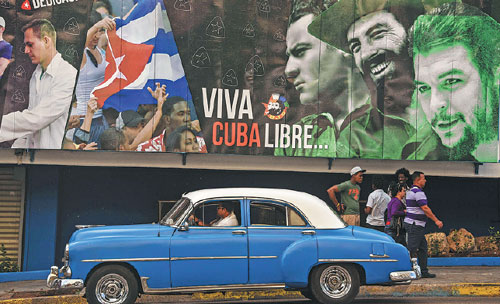From Kennedy to Obama, 50 years of secret talks
By Agence France-Presse in Washington (China Daily) Updated: 2016-03-21 08:02|
A classic car drives past a political poster reading "Long live Free Cuba" in Havana. US President Barack Obama will be the first sitting US president to visit Cuba since 1928. AFP |
Beyond the public animosity, stark statements and a trade embargo, there is another side to US-Cuba relations: exploratory missions, discreet negotiations and hands extended - in hotel hallways, airport waiting rooms and even the Vatican.
Barack Obama, who arrives in Havana on Sunday (local time) for the first visit by a sitting US president in nearly 90 years, will be the one remembered for opening a new chapter in ties between the United States and Cuba.
But he is not the first to have tried. For more than half a century, others have taken a stab at it, with the same buzzword always in mind: discretion.
While only about 160 kilometers separate the two countries, the idea of rapprochement has been a politically loaded one in America since Fidel Castro came to power in 1959.
Thanks to a number of third countries (Mexico, Spain, Brazil and Canada) and a host of intermediaries (aides, businessmen, journalists and writers, for starters), attempts at bridging the divide, many of them ambitious, have marked the history of bilateral relations.
In late 1962, after the eruption of the Cuban Missile Crisis - which risked escalating into a global nuclear conflict - John F. Kennedy explored the idea of a rapprochement, hoping to capitalize on Castro's fury at Moscow for withdrawing its missiles without even consulting him.
"Kennedy saw an opportunity to try to win Cuba back from the Soviet orbit," explains William LeoGrande, a professor at American University and co-author of the book Back Channel to Cuba: The Hidden History of Negotiations between Washington and Havana.
Kennedy chose a French journalist, Jean Daniel, to convey a message to Castro in 1963.
Daniel, tasked with being the ultimate diplomatic courier, met the Cuban revolutionary leader. He and Kennedy "seemed ready to make peace", he said later.
But on the very day that Daniel met Castro, Nov 22, 1963, Kennedy was assassinated in Dallas. The project fell apart. Kennedy's successor Lyndon Johnson did not wish to pursue the initiative.







